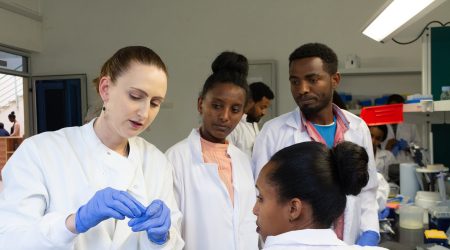Discovery raises hopes of more temperature tolerant wheat

Gene-editing techniques have helped to identify a temperature tolerance factor that may protect wheat from the increasingly unpredictable challenges of climate change.
Researchers in the group of Professor Graham Moore at the John Innes Centre made the discovery during experiments looking at wheat fertility in plants exposed to either high or low temperatures.
Wheat fertility and therefore yield is highly influenced by temperature, particularly the initial stages of meiosis when chromosomes from parent cells cross over and pair to create seeds for the next generation.
Meiosis in wheat functions most efficiently at temperatures between 17-23 degrees centigrade. It is known that developing wheat does not cope well with hot temperatures and can also fail during low summer temperatures.
Identifying genetic factors that help stabilise wheat fertility outside optimal temperatures is critical if we are to breed climate resilient crops of the future.
Previous research has indicated a major meiotic gene DMC1 as the likely candidate for preserving wheat meiosis during low and high temperatures.
Researchers at the John Innes Centre used gene-editing techniques to delete DMC1 from a variety of Chinese Spring Wheat, then carried out a series of controlled experiments to observe the effects of different temperatures on meiosis in the mutated plants.
The experiments revealed that after approximately one week, the gene-edited mutant plants were significantly affected when grown at a temperature of 13 degrees, with 95% of plants showing a decrease in crossover number.
At the other end of the temperature scale, wheat plants grown at 30 degrees also showed a reduced number of crossovers, compared to control plants.
The results confirm the hypothesis that DMC1 is responsible for preservation of meiotic crossovers at low and, to a lesser degree, high temperatures.
Given that the reduction in crossovers has significant effects on grain yield, these results have important implications for wheat breeders in the face of climate change.
Professor Moore said: “Thanks to gene editing we have been able to isolate a key temperature tolerance gene in wheat. It provides cause for optimism in finding valuable new traits at a time when climate change is challenging the way we grow our major crops.”
The next stage of this research is to look for variations of DMC1 which offer greater protection to wheat, and to investigate how dosage and expression levels of this gene in wheat may influence protection against wider variations in temperature.
Trials on temperature tolerance are taking place in Cordoba, Spain, where 30–40-degree centigrade temperatures are regular, posing a threat to wheat fertility and yield.
The study also highlights that DMC1 is a deeply conserved gene, controlling temperature tolerance in wheat and throughout the plant kingdom, including in other major crops.
Previous research, cited in this study, into a species of Japanese newt, also shows that fertility is compromised in temperatures below 13 degrees centigrade and that the temperature effect is related to DMC1 activity.
This research follows the earlier breakthrough by the Moore group at the John Innes Centre in identifying the wheat gene (ZIP4) responsible for correct chromosome pairing and preservation of wheat yield, but which also prevents the introduction of beneficial new traits from wheat wild relatives by suppressing chromosome exchange.
Using gene editing technology, the researchers have split the dual function of ZIP4 so that it maintains yields but enables wheat to be more easily crossed with wild relatives. This could contribute genetic diversity in elite varieties, including traits such as heat resilience and disease resistance.
Professor Moore added: “Climate change is likely to have a negative effect on meiosis and therefore on wheat fertility and ultimately crop yields, so screening of germplasm collections to identify heat-tolerant genotypes is a high priority for the future of crop improvement.”
‘DMC1 stabilizes crossovers at high and low temperatures during wheat meiosis’ appears in Frontiers in Plant Science.



